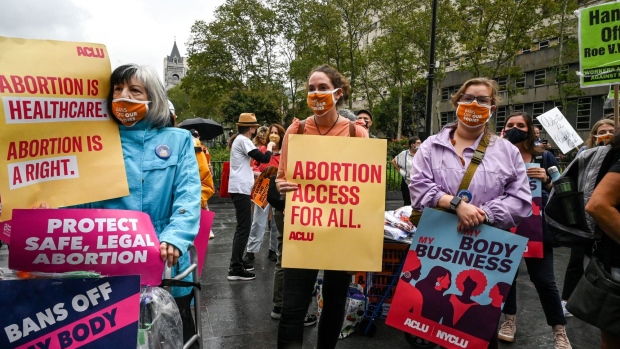Sep 22, 2021
Supreme Court Approval Drops as New Term Brings Divisive Issues
, Bloomberg News

(Bloomberg) -- As the U.S. Supreme Court nears the start of a term that will pose fresh challenges to its institutional legitimacy, a new poll is showing declining confidence in the court and growing concern that it is driven by politics.
The Marquette University Law School poll, released Wednesday, found nationwide approval falling to 49%, down from 60% in July and from 66% a year ago. The poll showed that 39% view the court as deciding cases mainly on politics, the highest percentage in the two years the survey has been conducted.
Those numbers come as the court prepares for the Oct. 4 start of a term likely to be dominated by the divisive topic of abortion. The court, which this month refused to block a Texas law banning abortion after about the sixth week of pregnancy, will hear arguments Dec. 1 on Mississippi’s bid to overturn Roe v. Wade, the 1973 ruling that legalized the procedure nationwide.
The Texas order likely helped drive down Democratic approval, which plunged from 59% in July to 37% in September, said Charles Franklin, director of the Marquette poll. The survey, which has a margin of error of plus or minus 3.4 percentage points, was conducted Sept. 7-16, just after the Supreme Court let the Texas law take effect.
The abortion decision came on the heels of Supreme Court emergency orders that blocked President Joe Biden’s eviction moratorium and ordered reinstatement of former President Donald Trump’s “remain in Mexico” policy for asylum seekers. All three cases divided the court along ideological lines.
“Whatever people might have seen as moderation on the court over the past year was followed by these three rulings right in a row and close together that all took a conservative tilt,” Franklin said.
‘Surprising’ Drop
Republicans support rose slightly, from 57% in July to 61% in September, after plummeting from 80% in September 2020. Franklin called the earlier drop “surprising,” given that it coincided with the 6-3 conservative majority created by Justice Amy Coney Barrett’s confirmation.
“It may be that Republicans having lost the presidency as Trump leaves office were feeling like that lowered their support for all the institutions, including the Supreme Court,” Franklin said. “It is also possible, but we don’t have very strong evidence, to say that Republicans were not satisfied with the court’s decisions over this past year moving far enough in a conservative direction.”
A Gallup poll released in July found the court’s public approval rating at 49%, down from 58% a year earlier.
In recent weeks, justices from across the court’s ideological divide have taken to the road to argue that they don’t operate as a political body -- and blaming the media for suggesting they do. Justices Barrett, Stephen Breyer and Clarence Thomas all said any differences among them stem from legal disagreements, not personal views or partisan motives.
“I think the media makes it sound as though you are just always going right to your personal preference,” Thomas told a crowd at the University of Notre Dame. “So if they think you are anti-abortion or something personally, they think that’s the way you always will come out. They think you’re for this, or for that. They think you become like a politician.”
Some observers say the court is approaching a dangerous moment, one in which Republican success in stacking the court could pay huge dividends for conservatives but put the court’s institutional standing in peril. The court is also considering a major gun-rights case in its upcoming term and will decide in the coming months whether to add an appeal that seeks to abolish university affirmative action.
“We may have come to a turning point,” said Irv Gornstein, executive director of the Supreme Court Institute at Georgetown Law Center. “If within a span of two to three terms, we see sweeping, right-side decisions over left-side dissents on every one of the most politically divisive issues of our time -- voting, guns, abortion, religion, affirmative action -- the perception of the court may be permanently altered.”
©2021 Bloomberg L.P.






